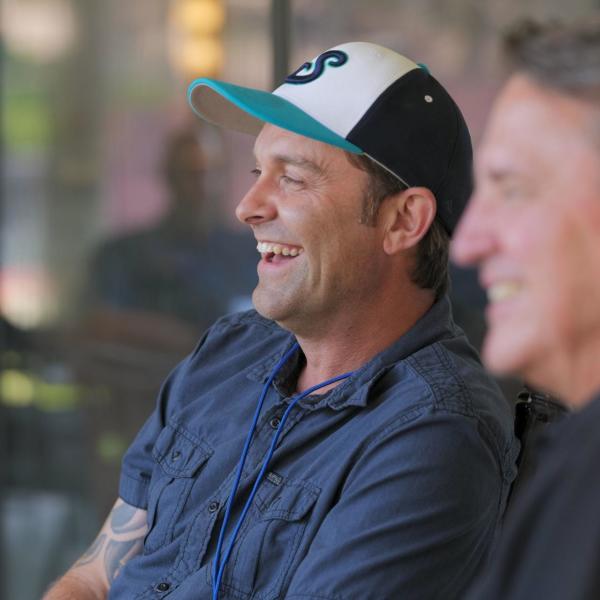The case of the missing chocolate eggs
With Easter coming up and more chocolate than normal in our homes, we explore the complex relationship that some care-experienced children may have with food
A couple of years ago, I didn't buy the Easter eggs until the day before Easter Sunday. This meant I had a very limited choice, which didn’t go down well with many in my family. This year, as soon as Easter eggs appeared in the shops I bought one each for all my children and hid them under my bed.
I’m a Mum to 4, 3 of whom came into our family through adoption and as Easter (or any other celebration or event) approaches I have regular, daily conversations with my children about what they can expect from the day. For my son, it’s constant reassurance that he would be receiving an egg, what exact type of egg it would be, what the others would be getting, how many days until he gets it and when he will be allowed to eat it. Gone are the days when we might have tried to keep this as a ‘surprise’ because the uncertainty that comes with that is too overwhelming for them to manage.
All children who have experienced trauma, as every care-experienced child has, live with a powerful sense of shame; an internal working model that says, ‘I’m not worthy’, ‘I don’t deserve nice things’, and so learning to understand and receive ‘treats’ like Easter eggs can be really consuming for a child’s mind. Learning to trust that their grown-up will give them the Easter egg they’ve been promised is difficult, particularly if they have previously experienced food being deliberately withheld or not arriving consistently or predictably.
A few days ago, my eldest son didn’t want breakfast, which is unusual because it’s his favourite meal of the day (it’s the most predictable; he has the same cereal in the same spot every day). I wondered if perhaps he had a ‘worried tummy’ about the ‘big write’ happening at school later that day, something which I knew he found so difficult? Or perhaps he had got too engrossed in a game upstairs to interrupt it for breakfast?
Later that day we discovered part of the reason. He had clearly found the Easter eggs and eaten all four of them including all the extras, leaving only a solitary pack of mini chocolate eggs. It’s the biggest chocolate haul in one go, but not the first time he has taken food.
If we’re honest, most of us as children snuck a chocolate or some sweets when a grown up wasn’t looking at some point, but this is different. Many children who’ve experienced trauma have issues around food; perhaps overeating to the point of being sick, complaining of hunger even after a large meal, stealing and hoarding food to eat later (or not) or perhaps a particular craving for or addiction to sugary foods.
So, what’s going on?
For many children, their relationship with food is disordered because of their early life experiences, particularly where there has been neglect. Perhaps they have developed a habit of taking food because they are simply not sure when, where or if they are going to have some again. This can still be the case months or years after living in a secure home where food is regularly and readily available. In a chaotic home, food may have been used to placate a child; they’re given sweets or chocolate to stop them crying and over time, they grow to associate sugary foods with comfort that they didn’t get from a caregiver.
Imagine having such a disordered relationship with food that the simple act of getting it - which most of us take for granted - pushes the systems in the body instinctively into survival mode. Imagine how exhausting and frightening this must be. Sadly, for many children, this state of hyper-arousal becomes their normal.
When a child’s physical needs aren’t met, we know it impacts the development of the brain. This includes the pathways that send it messages, meaning it can struggle to understand the internal signals around things like temperature, pain, thirst and hunger. It takes years of loving, consistent, therapeutic parenting and additional support to ‘rewire’ the circuits to begin to develop healthier pathways and connections.
So, what about when this kind of neglect is not part of a child’s story? Why does this also affect children who have experienced trauma but have not had access to food denied?
For our children especially (although not exclusively) it is easy to misunderstand an emotional need for a physical need. For my boy that day, the worry about the ‘big write’ and whether he could do it, how it made him feel about himself and the emotions that were inevitably rushing around, probably felt overwhelming. This was compounded by the fact that he did not understand what he was feeling or why, and certainly was not able to articulate it; the sad thing being that if he could do so, he could ask for help and perhaps get some relief. But, having already discovered the eggs or happily stumbling on them that day, he tried to fill that unidentified, emotional need with chocolate. At other times perhaps this need, this ‘hole’ is caused by trying to handle anger, frustration at siblings, worry or rejection.
One of the impacts of trauma is that it affects a child’s ability to develop healthy ‘cause and effect’ thinking appropriate to their chronological age. A toddler doesn’t understand why they shouldn’t eat sand or take food from someone else’s plate and we don’t expect them to, instead we help them, through nurture, to learn. We have to learn to consider the developmental age of children rather than ‘just’ their chronological age and respond appropriately to that rather than having unfair, unrealistic expectations that set them up to fail.
As those raising these brilliant kids, we must deal with some of our own feelings around this subject first (especially if it’s your Easter egg that’s been eaten!). Perhaps in your upbringing you had to eat everything on your plate, and that remains important to you? Maybe you have strong views on stealing and this issue pushes lots of buttons for you? We know we need to respond therapeutically, because otherwise it will simply reinforce the shame they feel, which is the very wiring that we want to see changed... but it’s hard!
If you’re a parent and you’re dealing with some sort of food issue, if you’ve had your last crème egg nicked or found last week’s dinner stuffed down the side of a bed, then you’re not alone. You're not on your own in finding it difficult or frustrating, in not knowing what to do next or in wondering if things will ever change. There is helpful stuff out there that might help you navigate where next. One of my favourites is ‘Rosie Rudey and the enormous chocolate mountain’ which is a therapeutic parenting book by Sarah Naish and Rosie Jefferies. It’s great for adults, to read with children or to leave around for them to ‘find’.
Or perhaps what you’d find most helpful is chatting to others who ‘get it’, who might have some experience and wisdom to share and, most importantly, some support for you in it! Peer support groups can be an incredible place for this – Home for Good has an online based one and if you’re an adoptive parent or carer and you’re not already connected with it then please do get in touch.
Maybe you’re alongside someone whose child has some issues around food. Perhaps this Easter, you know a parent or carer who might appreciate you dropping off an emergency Easter egg to replace one that’s been taken? Your invitation to their family to come for tea (when restrictions allow) despite these challenges might make all the difference to them? Or maybe you asking them about it with empathy and seeking to understand could be the support that gives them the energy and courage to keep going?
In my home? We’ve had lots more discussions about Easter; what we’ll do, what we’re going to eat and when. We’ve had more conversations about worried tummies, how cuddles might help and what to do when they come again. We’ve had a lot of sadness and frustration expressed at the natural consequence of there being one less Easter egg on Easter Sunday. There’s been a little more trust grown as we try and show him again that he is loved and accepted regardless of the choices he makes. After all that’s the extravagant, outrageous, unmerited way that God loves me and, in the pain, frustration and challenge of it all, that’s the kind of love we want to show.
Oh, and we’ve found a much more secure location for the replacement Easter eggs...
You might also be interested in

Blogs
A step towards stability
At Home for Good we are passionate about ensuring children and young people have a safe, secure and loving place to call home.
Read more
Blogs
Seven thoughts as the Government sets out its next steps for Children’s Social Care in England
This week the Government has made its long-awaited response to the Independent Review of Children’s Social Care in England.
Read more
Stories
Johnny’s story
Johnny's church has partnered with Home for Good and his desire is that this partnership mobilises people to give generously of their time, their resources and their ideas.
Read moreI would like to find out what is
going on in my area
Join our mailing list for the latest Home for Good news and ways to get involved.
Together we can find a home for every child who needs one.
£25 per month could help us create and collate inspiring articles and blogs that encourage and inform the families and communities who care for vulnerable children








 Thank you, you're giving:
Thank you, you're giving: